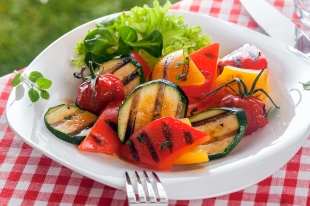Maintain Your Brain: Food and Water

For years scientists have explored the relationship between diet and brain development and within the plenty decade there has been plenty of research aimed at understanding how specific foods affect brain function. For instance, a 2014 study conducted by Rush University Medical School in Chicago found that cinnamon can positively impact degenerative diseases such as Parkinson’s and Alzheimer’s disease.
Other foods that are frequently named in studies related to brain health and optimization of memory include whole grains, salmon (Omega-3), blueberries, black currents, avocados, nuts and seeds, tomatoes, and dark chocolate.
Food Rules
While the list of ingredients touted as healthy ‘brain foods’ continues to grow, it’s important to remember that ultimately seniors are best off consuming a balanced diet that is rich in fresh fruit and vegetables, calcium, protein, whole grains and foods high in dietary fibre.
Food Recommended for Seniors:
Source: National Institute of Aging
- Fruit: 2-plus servings per day. Apples, oranges, bananas, many varieties of berries, and melons.
- Vegetables: 2-plus cups per day. Most are good for you but the best are the antioxidant-rich dark, leafy greens, such as kale, spinach and broccoli. Also especially good: carrots, squash and yams.
- Calcium: 1,200 mg per day. Found in milk, cheese, yogurt and cheese as well as non-dairy items such as almonds, broccoli and kale.
- Grains: 6-7 ounces per day (one ounce is one slice of whole grain bread). Choose pasta, breads and cereals with ‘whole’ grains.
- Proteins: Aging adults without kidney disease or diabetes need about 0.5 g of protein per pound they weigh (e.g. a person who weighs 150 lbs needs roughly 75 g of high-quality protein per day). Found in fish, some red meat, chicken, beans, peas, eggs, nuts, seeds, low-fat milk and cheese.
- Fibre: Men over 50 need 30 g per day, women over 50 need 21 g per day (one medium sized orange is 3 g). Found in whole grains, wheat cereals, barley, oatmeal, beans, nuts, vegetables such as carrots, celery, and tomatoes, and fruits such as apples, berries, citrus fruits, and pears. When you shop, check ingredients to find foods high in fibre.
For more information on healthy dietary choices, meal planning and snacking habits for seniors check out Healthy Eating After 50 and Eating Well as You Age.
Water Wellness
Hydration is vital to all aspects of health! For the brain it is required for basic function and for efficiency. Water can help ward off confusion, dry mouth, difficulty with chewing, and with other distressing conditions such as constipation and urinary tract infections.
For seniors it’s easy to forget to drink fluids regularly if they are less active and not as tuned into their sense of thirst. Experts suggest posting a note in your kitchen reminding you to sip water every hour and with every meal. While there is no consensus on the perfect amount of fluid to take in daily, the Mayo clinic maintains a standard of at least eight 8-ounce glasses per day.
One final note about eating and drinking … don’t get stuck in a rut! Nowadays there are all kinds of interesting vegetable prepared many different ways. Fruits from far-away lands can be a refreshing change from the usual choices. Bottled drinks in the organic section of the grocery store are tasty and chalked full of healthy ingredients. Eat well, drink well and be well!
Want more on keeping your brain active? Read our full Maintain Your Brain series on our blog.


